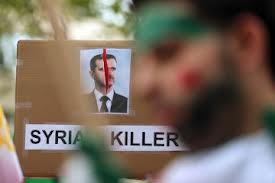 BASHAR AL-ASSAD is feeling confident enough to schedule an election six weeks from now that will extend his term as president by another seven years. And why not? Three years into the country’s civil war, Syrian government forces continue to make significant gains against rebels. This week they are reported to be close to recapturing the city of Homs, once considered the capital of the resistance. The regime has returned to using chemical weapons with impunity: Half a dozen attacks involving chlorine gas have been reported by opposition forces since last month. Though Mr. Assad is blockading the delivery of humanitarian aid to 4 million civilians in defiance of a U.N. Security Council resolution, there has been no reaction.
BASHAR AL-ASSAD is feeling confident enough to schedule an election six weeks from now that will extend his term as president by another seven years. And why not? Three years into the country’s civil war, Syrian government forces continue to make significant gains against rebels. This week they are reported to be close to recapturing the city of Homs, once considered the capital of the resistance. The regime has returned to using chemical weapons with impunity: Half a dozen attacks involving chlorine gas have been reported by opposition forces since last month. Though Mr. Assad is blockading the delivery of humanitarian aid to 4 million civilians in defiance of a U.N. Security Council resolution, there has been no reaction.
Meanwhile, the United States — the one power with the means to end the horrific crimes against humanity that are paving Mr. Assad’s road to “reelection” — no longer even pretends to have a strategy. On March 26, Assistant Secretary of State Anne Patterson responded to questions about the administration’s policy from the Senate Foreign Relations Committee by promising a classified briefing. Secretary of State John F. Kerry made the same pledge when senators from both parties demanded answers on April 8. The briefing has not yet been scheduled.
At the State Department’s regular news conference Monday, spokesman Jen Psaki acknowledged that Mr. Assad’s election contravened the Obama administration’s plan for internationally backed negotiations between the government and rebels on forming a transitional government. When asked whether the initiative was still alive, she answered: “We’re still working to determine what the next steps are.”
Ms. Psaki also reported that the administration had “indications” of the use of chlorine in an opposition-controlled village — an improvement on the administration’s previous stance of ignoring the latest chemical attacks. But when asked how the United States intended to react, she responded, “We’re still determining what the best mechanism is to get to the bottom of the facts.”
It’s not hard to understand the administration’s slowness in investigating reports of the use of chemical weapons. The incidents undermine the sole tangible accomplishment President Obama can claim in Syria: the removal and destruction of the regime’s chemical agents. That deal has disposed of more than 80 percent of the declared stocks, but experts expect the regime to miss the April 27 deadline for transporting the rest out of the country. Moreover, chlorine is not governed by the agreement, even though the Chemical Weapons Convention bans its use in war.
The administration has not been completely inert: In recent months, under pressure from Saudi Arabia and other allies, it has modestly increased covert support for the rebels. The Post’s Karen DeYoung reported that U.S. antitank missiles recently appeared in the hands of vetted rebel units. However, Mr. Obama still opposes giving the opposition antiaircraft weapons, which might deter Assad forces from using helicopters to drop chlorine and “barrel bombs” packed with deadly shrapnel onto civilian neighborhoods. The increased military support almost certainly won’t be sufficient to turn the tide in the war — much less accomplish Mr. Obama’s stated goal of removing Mr. Assad from power.
Ms. Psaki was asked if the administration still believed that “Assad’s days are numbered.” “We do,” she affirmed. Perhaps the administration is counting on the president to step down after the completion of his next seven-year term.
Read more about this issue: Stephen Hawking: Syria’s war must end David Ignatius: In Syria, a rebel with a cause The Post’s View: The U.S. must reconsider its failed Syrian policy Michael Gerson: In Syria, the United States is learning the lessons of inaction
Washington Post Editorial

Leave a Reply
You must be logged in to post a comment.